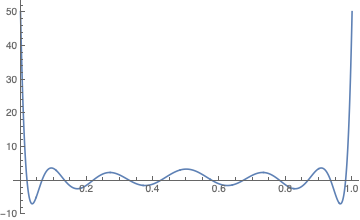We can construct a sequence of approximations $g_n$ that converges towards the true maximising probability distribution function $g$. (I believe it might be possible to show that the convergence is uniform if $g$ is continuous.)
Let $f \colon [0,1]^d \to \mathbb{R}$ be a continuous function. Approximate $|f|$ with the multivariate Bernstein polynomials of order $n$ (writing $f_{k_1\cdots k_d} = f(k_1/n, \ldots k_d/n)$ for short),
$$|f_n|(x) = \sum_{k_1 \cdots k_d} |f_{k_1\cdots k_d}| \prod_{i=1}^{d} \binom{n}{k_i} \, x_i^{k_i} (1-x_i)^{n-k_i} \;.$$
Let $S_{lm} = E[X^m (1-X)^{l-m}]$. The expectation of the approximant is then
$$E[|f_n|(X)] = \sum_{k_1 \cdots k_d} |f_{k_1\cdots k_d}| \prod_{i=1}^{d} \binom{n}{k_i} \, S_{nk_i} \;,$$
which should be maximal. The value of $S_{nk}$ is a linear combination on the first $n$ moments $M$ of the resulting distribution, and by a result of Hausdorff, there is indeed a unique distribution for a given set of moments iff all $S_{lm}$ (ie. not just for $n, k$) are positive. Expanding
$$S_{lm} = \sum_{r=0}^{l} \binom{l-m}{r-m} (-1)^{r-m} \, M_r \;,$$
the expectation in terms of the moments is
$$E[|f_n|(X)] = \sum_{k_1 \cdots k_d} \sum_{r_1 \cdots r_d} |f_{k_1\cdots k_d}| \prod_{i=1}^{d} \binom{n}{r_i} \binom{r_i}{k_i} (-1)^{r_i-k_i} \, M_{r_i} \;.$$
The problem is hence the constrained multilinear optimisation
$$ \begin{aligned} \max_{M_1 \cdots M_n} \;&\; \sum_{k_1 \cdots k_d} \sum_{r_1 \cdots r_d} |f_{k_1\cdots k_d}| \prod_{i=1}^{d} \binom{n}{r_i} \binom{r_i}{k_i} (-1)^{r_i-k_i} \, M_{r_i} \;, \\ \text{s.t.} \;&\; \sum_{r=0}^{l} \binom{l-m}{r-m} (-1)^{r-m} \, M_r \ge 0 \;, \\ &\; M_r \in [0,1] \;, \quad M_0 = 1 \;. \end{aligned} $$
Once the moments are found, the function $g_n$ is itself constructed as a Bernstein polynomial of order $n$,
$$g_n(x) = \sum_{k=0}^{n} \binom{n}{k} \, g_{n,k} \, x^k (1-x)^{n-k} \;,$$
with the function values $g_k = g_n(k/n)$ to be determined by the recovered moments. The moments of $g_n$ are
$$ \begin{aligned} M_r &= \sum_{k=0}^{n} \binom{n}{k} \, g_{n,k} \int_0^1 \! x^{k+r} (1-x)^{n-k} \, dx \\ &= \sum_{k=0}^{n} \frac{n! \, (k+r)!}{k! \, (n+r+1)!} \, g_{n,k} \;, \end{aligned} $$
This is readily inverted to give the function values $g_{n,k}$.
From a cursory Google search, multilinear optimisation appears difficult (but I have no idea, really). Nevertheless, it is a recipe for calculations: For the baby problem, I find the moments (with $n = 12$) 0.5, 0.40042, 0.35063, 0.323633, 0.308033, 0.298489, 0.292331, 0.288158, 0.2852, 0.283021, 0.28136, 0.280058 using a quick Mathematica test run, and the numbers are relatively robust against changes in $n$ and match the distributions suggestions from the comments. Here is a sample plot, where you can see that Runge's phenomenon is quite pronounced for such low values of $n$.

